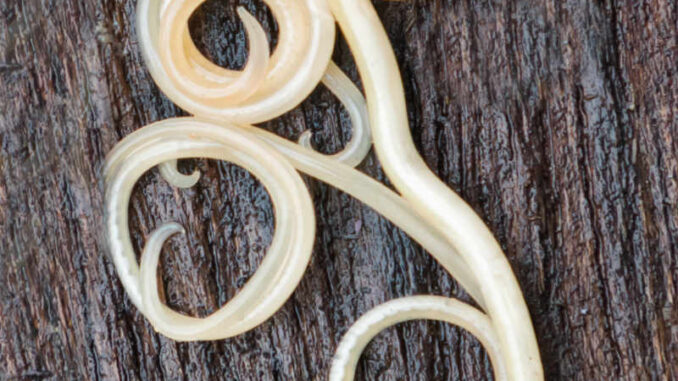
This article was updated on January 16th, 2024
What Do Roundworms Look Like?
Roundworms (Toxocara Canis) look like long white worms. Adult roundworms look like thick pieces of spaghetti and can be anywhere from 4-6 inches long. Worms this size can be found inside the small intestine of an infected dog. The picture below shows a group of adult roundworms.
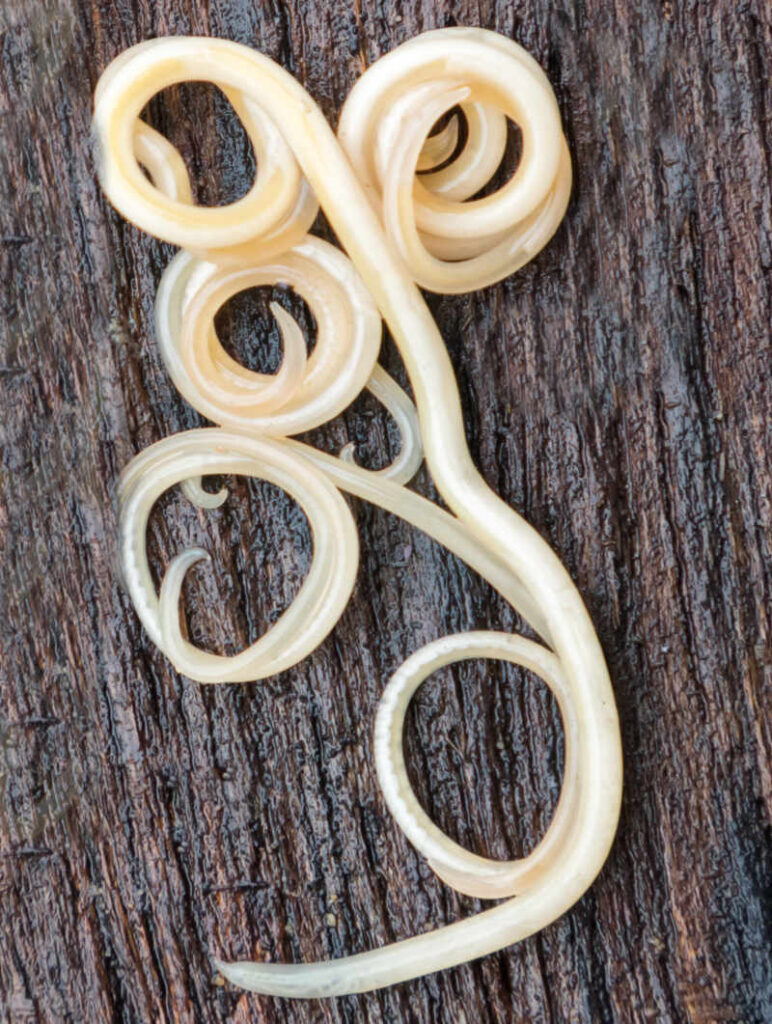
They are the most commonly found intestinal parasite in dogs and in dog poop. Many dogs will have them at some point in their lives. However, they are especially problematic in puppies. As a veterinarian, I’ll never forget the first puppy I met with roundworms. It was terrible! His belly was so full of worms that he looked like a potbelly pig. He was so infested that he was vomiting and pooping worms. It was traumatizing for both of us! But there is no reason your dog should have to suffer like that poor puppy. Roundworms are TREATABLE!
Read on to find out all things about roundworms in dog poop, including pictures to help you identify what your dog might be suffering from.
What roundworms in dog poop look like
(warning, graphic images!)
Roundworm eggs are usually hard to see in your dog’s poop. However, it is common to see whole worms in dogs with severe infections.
*warning: graphic images ahead*
Below are 2 pictures of severe cases of roundworms in a dog’s poop:
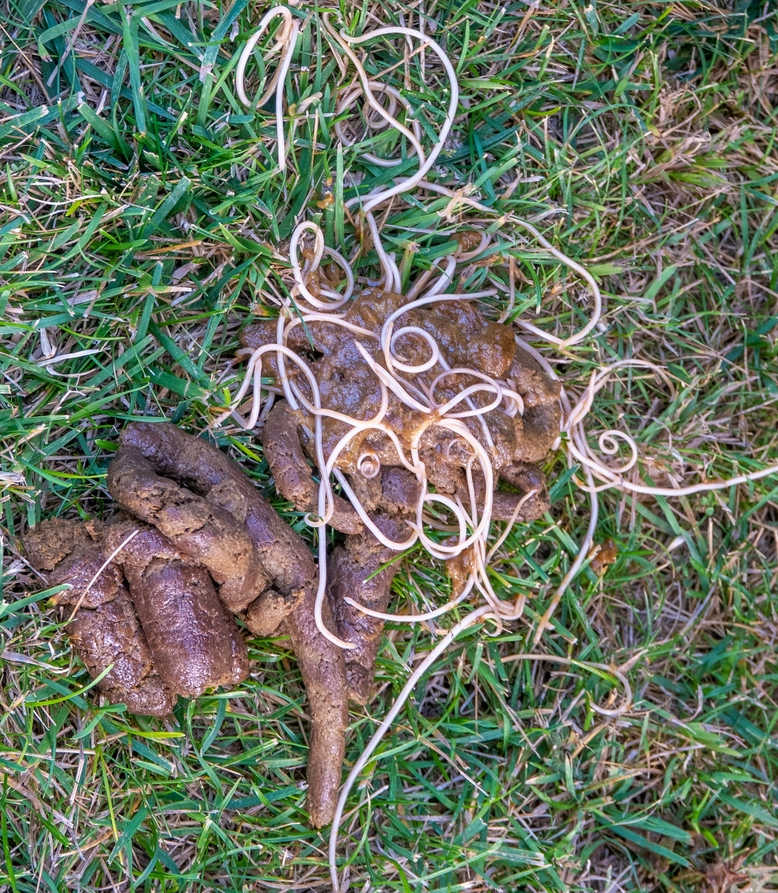
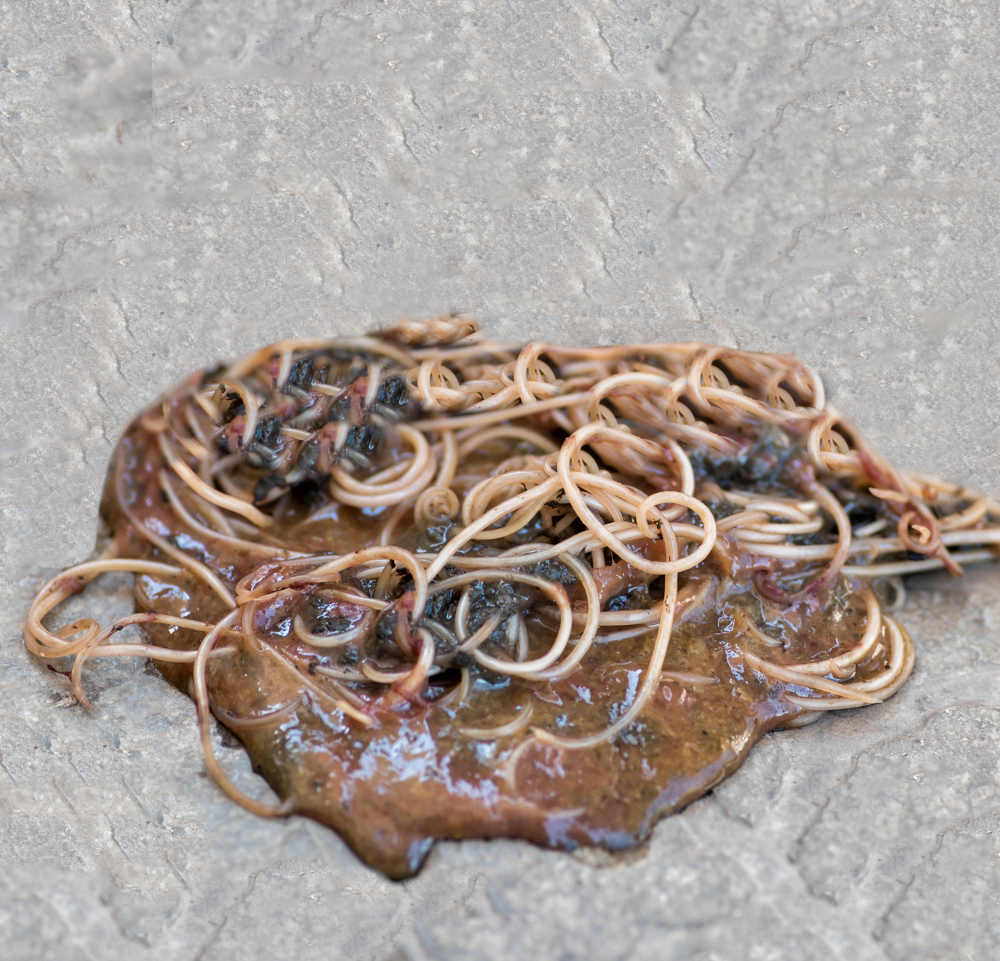
How to make sure that the worms in your dog’s poop are really roundworms:
There are many types of worms in dogs. Some of the most common are whip-worm, hook-worm, round-worm, and tape-worm. It is difficult to determine the type of worm your dog has by looking at it and you should never assume your dog has roundworms with a picture. However, it is helpful to know what to look for. Below you will find pictures that show the visual differences between a few common types of worms in dogs.
Roundworms vs tapeworms in dog’s poop
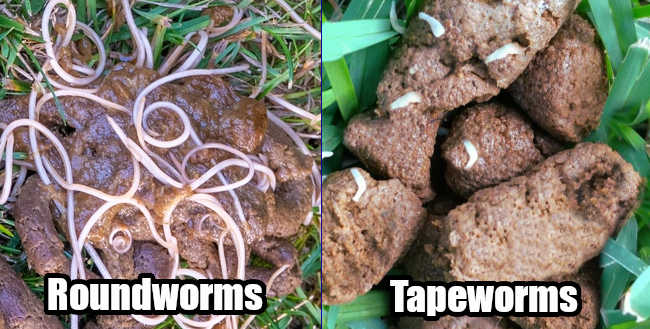
Roundworms: are usually white or light brown and can be up 2-3 inches long. They often come out whole (not segmented).
Tape-worms: are flat like tape and they are often seen in segments (about the size of a grain of rice). As tapeworms mature in the intestine, the segments (called proglottids) break off and come out in the dog’s poop. Tapeworms are also caused by flea infestation so your dog will likely be itchy if he has them.
Roundworms vs whipworms in dog’s poop
Roundworms: Roundworms are much wider and rounder than whip worms and they usually aren’t accompanied by bloody diarrhea.
Whipworms: look like tiny pieces of thread and they are larger at one end. They are only 3-6 inches long and can be accompanied by bloody diarrhea.
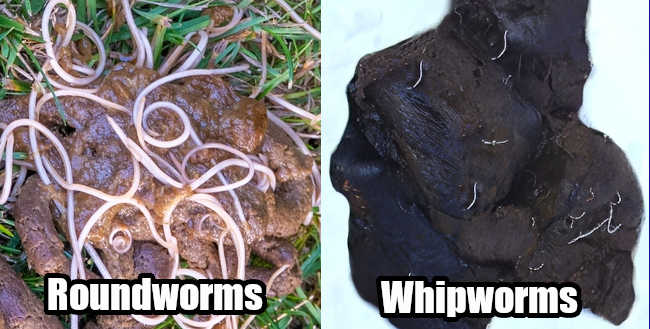
Hookworms vs roundworms in dogs poop
Hookworms: are white to light brown and very thin, they are so thin that they are barely visible to the naked eye (1/8 inch). They are also known to cause:
- Dehydration
- Anemia
- Inability to exercise
- Pale gums
Roundworms: are much bigger than hookworms and they can easily be seen in poop and vomit.
What are the symptoms of roundworms in dogs?
Symptoms are different for every dog. Puppies usually show the most symptoms and adult dog’s sometimes don’t show any at all.
Some of the symptoms of roundworms in puppies are:
- Poor or stunted growth
- Weight loss
- Large potbelly-like stomach
- Worms in stool
- Worms in vomit – less common unless roundworm infection is severe
- Coughing
- Diarrhea
- Mucus in poop
- Erratic appetite
- Weak immune system
- Seizures-in severe cases
- Pneumonia-in severe cases
- Death-in severe cases
Symptoms of roundworm in adult dogs:
Dogs over 6 months of age do not usually show symptoms. This is because larvae swallowed by adult dogs are trapped in cysts in the dog’s muscles. Very few roundworms make it to maturity. Roundworms in adult dogs are hard to diagnose because they usually don’t have adult worms in their poop. Which is why fecal tests are recommended. Fecal tests can find eggs and parasites in your dogs poop at the microscopic level.
Dogs with roundworms need quick veterinary treatment
All dogs who have worms need quick treatment. Roundworms make puppies extremely uncomfortable. They often suffer from extreme bloating and they don’t usually feel like eating. If you notice any of the following symptoms in your dog, you should visit the vet immediately:
- Enlarged painful abdomen
- Diarrhea
- Vomiting
- Weight loss
- Dull hair
- Coughing
It is never a good idea to hold off on treatment. Puppies who don’t get proper treatment could die from a roundworm infestation.
When are roundworms in a dog’s poop an emergency?
Roundworms in dog poop always need quick treatment. They can make your dog incredibly ill and uncomfortable. Infection with roundworms can even result in death. Some signs your dog needs emergency treatment are:
- Seizing (shaking)
- Lethargy (weakness)
- Inability to keep food down (throwing up as soon as they eat)
- Severe vomiting
- Severe diarrhea
Are there over-the-counter treatments that can get rid of roundworms?
There are many over-the-counter deworming medications available to the public. However, these medications each treat specific types of worms. The only way to effectively treat roundworms is to get medication from your veterinarian.
There is no way to tell which type of worm you’re treating unless you visit the veterinarian. If you attempt to treat your dog with a home remedy you risk the infection progressing to an emergency. Roundworms and other parasites are one of the easiest, most affordable issues to treat with a veterinarian’s help.
So how did my dog get infected with these terrible long worms?
Well, it’s complicated. Roundworms can be passed from infected to uninfected dogs in several ways.
1. From a mother to her puppies: one way they are passed is from a mother to her puppies. When a pregnant dog is infected with roundworms, (or she has encysted larvae in her body from a previous infection), she can pass the larvae stage of the roundworm through the placenta to the developing puppies or through milk when puppies are nursing. It is critical to have your vet deworm any pregnant dogs and puppies, even if you haven’t seen worms in their stools.
2. Contaminated soil: eating dirt, or scavenging outdoors where roundworm eggs are present. roundworm eggs passed into the stool, can take up to a month to mature and become infective; with these roundworms, fresh feces are NOT infective, but the contaminated soil will be.

3. Eating an animal or a paratenic host that is carrying roundworms eggs (ex. birds, rodents, cockroaches, and earthworms.)
Veterinarian treatment, costs & recovery
Treatment
When treated right away, both treatment and recovery are quick. Your veterinarian will do an exam, collect a fecal (poop) sample, and send it out to the lab. Results come back within 3-5 days. The fecal results will show if your dog has roundworms, or any other worms or parasites. If your vet suspects that the worms your dog has are roundworms, they may give him medication right there. If they aren’t sure it’s roundworms, they may wait for the fecal results before giving the medication. Once the medication is given most of the worms will be killed within 3 days. Your vet will then recommend regular parasite control and fecal testing.
Cost of treatment for roundworms
Fecal test: The average cost of a fecal test in the U.S. is $25-45.
Deworming: The cost of deworming depends on the type of parasite, the medication used, and your dog’s weight. Puppies will need multiple doses of deworming medication, while adults will only need it every 3-6 months.
Overall, the average cost is $50-100. This includes the exam, the fecal test, and deworming medication. In more severe infections, multiple doses of medication and repeat fecal tests will be needed. If your dog is very ill to the point of needing hospitalization the cost will be much higher.
Common medication used to treat roundworms are:
- Fenbendazole
- Ivermectin
- Pyrantal
- Milbemycin
- Moxidectin
- Piperazine
Prevention
Roundworms are prevented by following veterinarian protocols for preventing parasites. Parasite control includes:
- Regular fecal/parasite testing (every 6 months)
- Regular deworming, every 3-6 months for adult dogs. For puppies, deworming starts at 2 weeks, then repeated every 2 weeks, until they reach 8 weeks of age.)
- Remove infected feces from your dog’s environment.
Your veterinarian will send a poo sample out to a lab where they will examine it for eggs and worms. The result is usually back in 3-5 days. The results of the fecal test help your vet decide which deworming medication to treat your dog with. Once you begin medication, the worms should be gone within days. In severe infections or treatment of puppies, deworming may need to be repeated.
FAQ
Are roundworms contagious to other dogs?
Roundworms can be passed from infected to uninfected dogs in several ways. One way they are passed is from a mother to her puppies. When a pregnant dog is infected with roundworms, (or she has encysted larvae in her body from a previous infection), she can pass the larvae stage of the roundworm through the placenta to the developing puppies. Larvae are also passed through milk when puppies are nursing. This is why it is critical to have your vet deworm any pregnant dogs and puppies even if you haven’t seen worms in their stools.
Can I get roundworms from my dog?
Yes, humans can get roundworms. Infection occurs when you swallow roundworm larvae. Think of when you let your dog lick your mouth, or when you get feces on your hands, and put your hands in your mouth. In order to prevent chances of infection, wash your hands after handling dogs and puppies, Especially dogs that haven’t been treated with a roundworm preventative. Humans infected with round worms usually don’t have symptoms. However, roundworms can cause a a condition called Visceral Larva Migrans, which causes fever, an enlarged liver, and blindness.
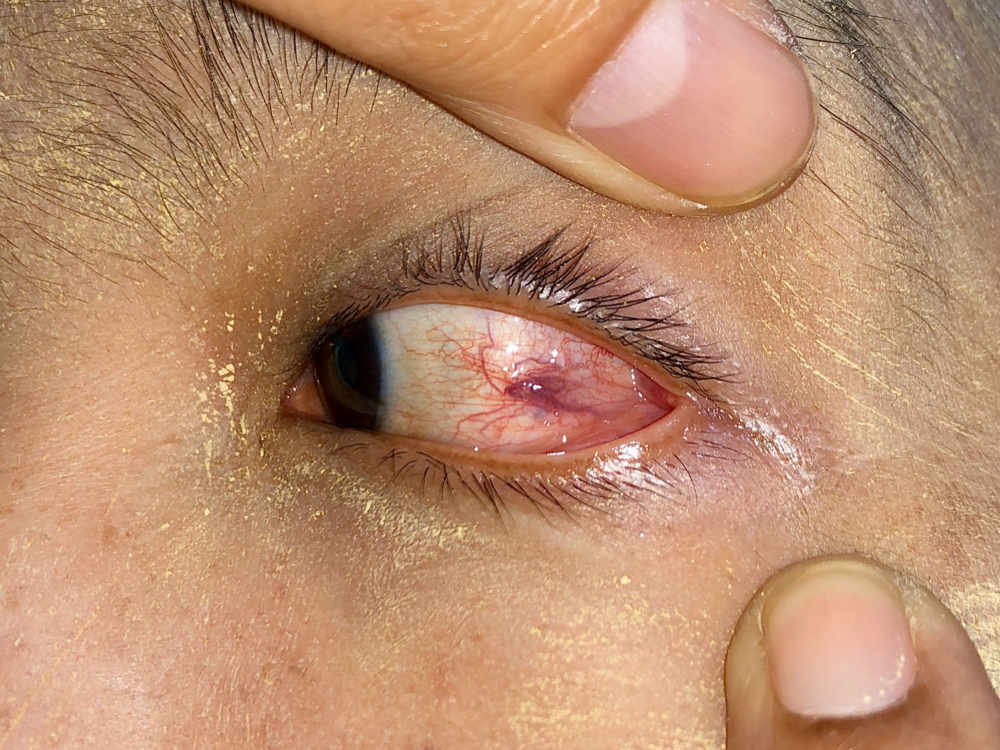
Is it true that children can get roundworms?
Yes, children can get roundworms too. In fact, roundworm infection is the most common type of worm infection in the world. According to an article written by Stanford health, “If a child swallows a roundworm egg, it travels into the intestine and hatches into a baby worm (larvae). Larvae can then pass into the bloodstream and travel through the lungs and into the throat. They are then swallowed again and return to the small intestine. They then grow into adult worms in the small intestine.”
Related posts:
Disclaimer: This website's content is not a substitute for veterinary care. Always consult with your veterinarian for healthcare decisions. Read More.

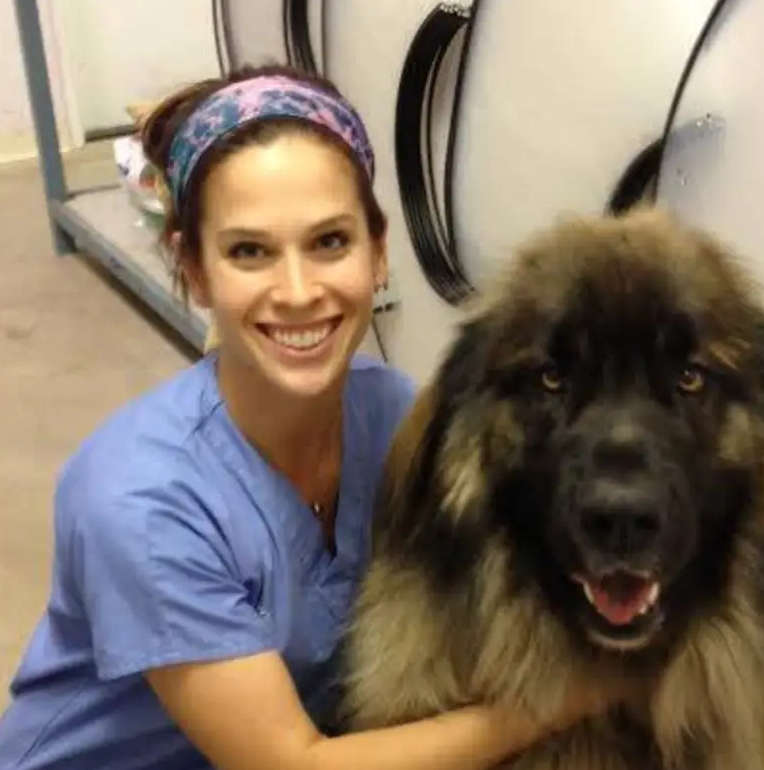




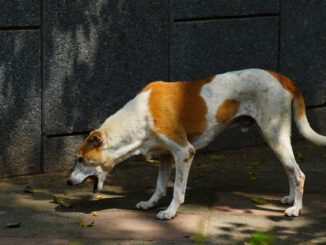


Be the first to comment